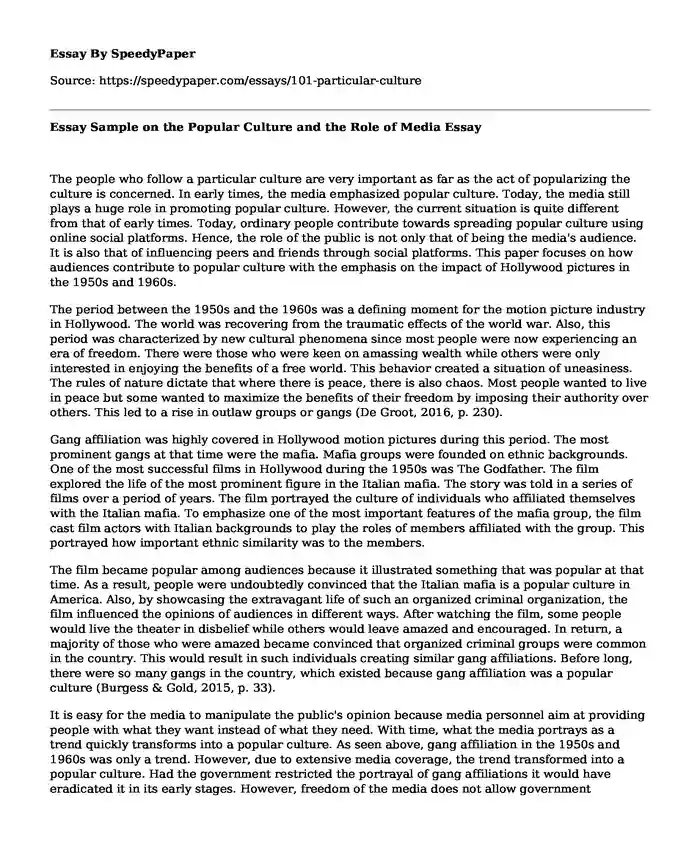The people who follow a particular culture are very important as far as the act of popularizing the culture is concerned. In early times, the media emphasized popular culture. Today, the media still plays a huge role in promoting popular culture. However, the current situation is quite different from that of early times. Today, ordinary people contribute towards spreading popular culture using online social platforms. Hence, the role of the public is not only that of being the media's audience. It is also that of influencing peers and friends through social platforms. This paper focuses on how audiences contribute to popular culture with the emphasis on the impact of Hollywood pictures in the 1950s and 1960s.
The period between the 1950s and the 1960s was a defining moment for the motion picture industry in Hollywood. The world was recovering from the traumatic effects of the world war. Also, this period was characterized by new cultural phenomena since most people were now experiencing an era of freedom. There were those who were keen on amassing wealth while others were only interested in enjoying the benefits of a free world. This behavior created a situation of uneasiness. The rules of nature dictate that where there is peace, there is also chaos. Most people wanted to live in peace but some wanted to maximize the benefits of their freedom by imposing their authority over others. This led to a rise in outlaw groups or gangs (De Groot, 2016, p. 230).
Gang affiliation was highly covered in Hollywood motion pictures during this period. The most prominent gangs at that time were the mafia. Mafia groups were founded on ethnic backgrounds. One of the most successful films in Hollywood during the 1950s was The Godfather. The film explored the life of the most prominent figure in the Italian mafia. The story was told in a series of films over a period of years. The film portrayed the culture of individuals who affiliated themselves with the Italian mafia. To emphasize one of the most important features of the mafia group, the film cast film actors with Italian backgrounds to play the roles of members affiliated with the group. This portrayed how important ethnic similarity was to the members.
The film became popular among audiences because it illustrated something that was popular at that time. As a result, people were undoubtedly convinced that the Italian mafia is a popular culture in America. Also, by showcasing the extravagant life of such an organized criminal organization, the film influenced the opinions of audiences in different ways. After watching the film, some people would live the theater in disbelief while others would leave amazed and encouraged. In return, a majority of those who were amazed became convinced that organized criminal groups were common in the country. This would result in such individuals creating similar gang affiliations. Before long, there were so many gangs in the country, which existed because gang affiliation was a popular culture (Burgess & Gold, 2015, p. 33).
It is easy for the media to manipulate the public's opinion because media personnel aim at providing people with what they want instead of what they need. With time, what the media portrays as a trend quickly transforms into a popular culture. As seen above, gang affiliation in the 1950s and 1960s was only a trend. However, due to extensive media coverage, the trend transformed into a popular culture. Had the government restricted the portrayal of gang affiliations it would have eradicated it in its early stages. However, freedom of the media does not allow government restriction on such matters. Hence, the public can only learn to avoid being manipulated by the media.
References
Burgess, J., & Gold, J. R. (Eds.). (2015).T Geography, the media and popular culture. Routledge.
De Groot, J. (2016).T Consuming history: Historians and heritage in contemporary popular culture. Routledge.
Cite this page
Essay Sample on the Popular Culture and the Role of Media. (2019, Feb 28). Retrieved from https://speedypaper.com/essays/101-particular-culture
Request Removal
If you are the original author of this essay and no longer wish to have it published on the SpeedyPaper website, please click below to request its removal:
- Half a Yellow Sun - A Literary Essay Example for You
- History of Islam Essay Sample
- "Ceremony" by Leslie Marmon Silko. Literary Essay Sample
- Lending Institutions, Health Care, and Human Capital: Kenya, Economics Essay Example
- Free Essay about Dual Federalism and Cooperative Federalism
- Essay Sample on Market Penetration Strategy
- Uplifting Underprivileged Society Through Community Education - Essay Sample
Popular categories





